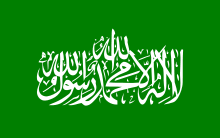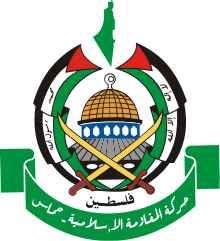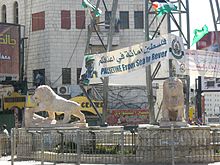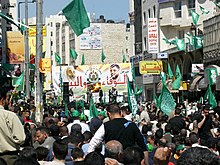Hamas
![]()
The articles Hamas#Founding Charter and Hamas Charter overlap thematically. Information you are looking for here may also be in the other article.
You are welcome to participate in the relevant redundancy discussion or to help directly to merge the articles or to better distinguish them from one another (→ Instructions).
Hamas (Arabic حَمَاسْ, DMG ḥamās 'enthusiasm', 'zeal', 'fighting spirit', at the same time acronym HAMAS from Ḥarakat al-muqāwama al-islāmiyya 'Islamic Resistance Movement') is a radical Islamic Palestinian organization or a Sunni Islamist Palestinian terrorist organization. It was founded in 1987 as a branch of the Muslim Brotherhood by Ahmad Yasin and others. It consists of the paramilitary Qassam Brigades, an aid organization, and a political party.
Hamas aims, among other things, to eliminate the State of Israel by military means and to establish an Islamic state. In its founding charter, published on 18 August 1988, Hamas referred to the world's most influential anti-Semitic conspiracy theory, the Protocols of the Wise Men of Zion, which were exposed as a forgery as early as 1921. On May 1, 2017, Hamas published a policy and position paper whose character as a replacement of the 1988 charter or merely its supplement is disputed.
Its military arm has been carrying out suicide bombings and other attacks since 1993, mainly against Israeli civilians and soldiers. It is legally classified as a terrorist organization by the European Union, the United States, Israel, and other states, including Arab-Muslim states.
Since its election victory in 2006 and the civil war-like battle for Gaza in June 2007, which was perceived internationally predominantly as a Hamas coup, Hamas has provided the government in the Gaza Strip.

The flag of Hamas, a calligraphy of the Shahāda against a green background.

The Hamas emblem shows two crossed swords, the Dome of the Rock, and a map of present-day Israel, including the West Bank and Gaza Strip, which it claims entirely as Palestine. The image of the Dome of the Rock is framed by two Palestinian national flags
Ideology
Founding Charter
On August 18, 1988, Hamas published its founding charter. It combines ideology and strategic considerations. According to Colin Shindler, a lecturer in modern Jewish studies at the University of London, the charter synthesizes the imagery of the Koran, historical distortion of facts, and unadulterated anti-Semitism. The Protocols of the Elders of Zion are referred to several times in this document, despite their forgery, in order to create a demonizing character image of world Jewry.
Article 8 contains Hamas's slogan: "Allah is its goal, the Prophet its model, the Koran its constitution, jihad its path, and death for God its noblest wish." For the charter, Palestine encompasses the entire region including Israel and parts of Jordan. Israel is described as a "Zionist entity" whose "Islamic homeland" (Waqf) should never be left to non-Muslims because it has been entrusted to Muslims until the Day of Judgment (Art. 11). Therefore it is the religious duty (fard `ain) of every Muslim to fight for the conquest of Israel. This ideology is justified theologically with quotations from the Koran. It denies Israel's right to exist and implies the dissolution of this state and of any non-religious Palestinian administrative authority.
Hamas rejects negotiations and conferences as a "waste of time" and "futile efforts" for the Palestinians' concerns. They are "nothing more than a means of appointing infidels as arbitrators in Islamic countries". But for Palestine, he said, there is no solution other than jihad; in doing so, "neglecting any part of Palestine is tantamount to neglecting the Islamic faith." "So-called peace solutions and international conferences" were "contrary to the principles of the Islamic resistance movement" (Article 13).
Therefore, the Charter criticizes the PLO's secular agenda and its approval of UN Resolutions 242 and 338, by which the PLO recognized the State of Israel in 1988. On the other hand, the Charter refers to the PLO as the father, brother, relative, or friend of the Islamist movement, stressing that it shares the same goals, the same destiny, and the same enemy.
The Charter accepts other religions in the region only under the "wings of Islam". Only under it could the "followers of other religions live safely and under the protection of way of life, property and rights". Without Islam disunity would arise and injustice and corruption would flourish (Article 6). Article 31 therefore states that only under the wing of Islam would law and order prevail. The expression "under the wings of Islam" means that non-Muslims as dhimmi within an Islamic state are protected against persecution against the payment of a special poll tax (jizya) and are subordinated in religious questions to their own authorities (e.g. marriage, divorce), but compared with Muslims they are regarded as second-class citizens. This is expressed, for example, by the fact that their testimony is less valid in court, they are not allowed to carry weapons, etc.
Article 7 of the Charter declares the killing of Jews - not just Jewish citizens of Israel or Zionists - to be an unconditional duty of every Muslim, making it a prerequisite for the coming of the Last Judgment:
"The Hour of Judgment will not come until Muslims fight and kill the Jews, so the Jews will hide behind trees and stones, and every tree and stone will say, 'O Muslim, O servant of Allah, a Jew is behind me, come and kill him!'"
- Sahīh Muslim, Book 41, Number 6981, quoted in Article 7.
In Article 22, the Charter adopts as fact the anti-Semitic conspiracy theory of world Jewry that had developed in Europe: the Protocols of the Wise Men of Zion were genuine, the Freemasons, the Lions Club and the Rotary Club were secretly working "in the interests of the Zionists". The Jews were responsible for the French Revolution, "Western colonialism," communism, and the world wars: "There is no war where they don't have their fingers in the pie..."
It follows from this that Article 32:
"To leave the circle of conflict with Zionism is treason. All who do so shall be accursed. 'Whoever turns his back on them [...] incurs the wrath of Allah, and his abode shall be Hell... (Qur'an, 8:16)"
- Article 32; in Baumgarten p. 224
World Zionism, in conjunction with imperialist powers, was seeking through a sophisticated strategy to exclude the Arab states one by one from the circle of fighters against Zionism, in order to then face the Palestinian people exclusively. Egypt, for example, had been broken out of the anti-Israeli front by the insidious Camp David agreement. Zionists aspired to global expansion.
Reception
In 2008, the political scientist Matthias Küntzel described the Hamas Charter as "probably the most important manifesto of Islamism to date". Sari Nusseibeh, the Palestinian president of Al-Quds University in Jerusalem, was particularly critical of the anti-Semitic part of the charter, saying it sounded like a direct quotation from the Nazi diatribe Der Stürmer.
Whether the Charter still determines Hamas's positions was questioned on various occasions after its electoral success in 2006. According to MEMRI, the original Arabic version of the charter is difficult to find. A survey of Hamas activists and deputies by the Jerusalem Post revealed that many were unaware of the Charter's anti-Semitic statements. Historian Khaled Hroub sees more recent Hamas documents, such as its 2005 election manifesto, as deviating from positions in the founding charter. However, this has never been changed. Calls for the murder of Jews and the destruction of the Zionist entity by Hamas representatives showed that they still pursue the goals of the charter.
Holocaust Denial
In response to a January 2000 conference on the Holocaust in Stockholm, a Hamas text described the Holocaust as a Zionist falsification of history. Abd al-Aziz ar-Rantisi, one of the founders and interim leader of Hamas, called the Holocaust the greatest of lies, propaganda spread by the Zionists through the media. He also stated that the murder of many Jews by the Nazis was supported by the Zionists in order to force Jews to emigrate to Palestine. He also claimed that the Nazis were financially supported by the Zionists.
In 2008, however, Bassem Naeem, the Hamas government's information and health minister in Gaza, distanced himself from Holocaust denial in a British newspaper article.
In 2009 and 2011, Hamas strongly objected to the Holocaust being taught in schools run by UNRWA, a UN agency that runs schools in the Gaza Strip. A statement by a Hamas spokesman for the Ministry of Refugee Affairs said, among other things, that this would "poison the minds of the students.

2006: Hamas election poster in Ramallah. It calls for a "Palestine from the sea to the river".
Organization
Structure
Hamas is loosely structured into organizations that work both secretly and publicly in mosques and social aid institutions to recruit members, raise funds, and organize activities. Along with the National Shūrā Council, the Political Bureau represents the second central organ of Hamas' political arm. Hamas is particularly popular among Palestinians living in the Gaza Strip. But it also finds supporters in the West Bank and, to a lesser extent, in other Middle Eastern states (including Israel). This popularity is also based on its social services and the hope of even long-time Fatah party supporters and activists that Hamas will bring an end to corruption in the old Arafat party and thus renew the political landscape.
Various Hamas organizations have used both political and violent (including terrorist) means to achieve their political goals (such as suicide bombings). Hamas considers all of these acts as legitimate "resistance" against the "occupying power" Israel. Various groups are represented in Hamas' military wing:
- the Ayyash students, the student units of engineer Yahya Ayyash (in memory of Yahya Ayyash, responsible for the deaths of more than 50 Israelis; he was killed by the Shin Bet in 1996 with a rigged cell phone),
- the Izz-ad-Dīn-al-Qassām brigades or battalions (in memory of Sheikh Izz ad-Dīn al-Qassām, killed by the British in 1935).
- the executive units, which were set up as a security force of around 6,000 men (as of June 2007) by Ismail Haniyya, the prime minister of the Palestinian unity government appointed by Hamas in 2006. The executive units compete with the police, military and Fatah militia units controlled by President Mahmoud Abbas. This force was instrumental in Hamas' victory over Fatah in the Gaza Strip in June 2007.
Hamas is constantly recruiting members in mosques and universities. One estimate puts the number of members at 80,000, while the hard core of Hamas is estimated at between 300 and 3,000 members. Regarding the gender distribution in the political leadership structures, the Political Bureau is staffed exclusively by men, but women are involved in external political structures: Hamas women, for example, moved into local councils and the Palestinian Legislative Council after the 2006 elections.
Hamas and its sub-organisation, the Qassam Brigades, are classified as a terrorist organisation by the EU, Australia, Canada, Israel, the USA, Japan and other, mainly Western, states. In 2003, EU foreign ministers placed Hamas itself and its political arm on the list of terrorist organizations. Since then, Hamas supporters can be prosecuted and their accounts frozen.
The authorities in Jordan closed the Hamas office in Amman in 1999. The members of the politburo were arrested and expelled. In April 2006, according to the Jordanian government, members of Hamas were arrested in Jordan for carrying out attacks in Jordan on the instructions of Hamas' Syrian leadership in exile. Jordanian television showed weapons caches that authorities said had been planted by Hamas. In November 2011, the government described the expulsion as a mistake, followed in January 2012 by the first official reception of the Hamas politburo chief by the Jordanian king.
Leadership
The co-founder and spiritual leader of Hamas, Sheikh Ahmad Yasin, was deliberately killed on March 22, 2004, in a rocket attack by the Israeli Air Force as part of the so-called Operation Change of Staff. A few days later, Yasin's deputy, pediatrician Abd al-Aziz ar-Rantisi, was proclaimed the new "commander general" in Gaza. Shortly thereafter, he went underground. Like Yasin, he held that terrorist attacks were a legitimate means "in the liberation struggle against Israel." Less than a month after his ascension to Hamas leader on April 17, 2004, Rantisi, like Yasin, was targeted for death by the Israeli army. Rantisi stood for the radical wing of the organization and had rejected the hudna (temporary ceasefire) in the summer of 2003. He became known as the spokesman for 400 fighters deported to Lebanon and through his contacts with Hezbollah and Iran.
In response to the targeted killings by the Israeli military, Hamas subsequently no longer appointed a sole leader of the organization. In the following years, the Syrian capital Damascus was considered the new control center. Among others, the influential head of Hamas' politburo, Chalid Mashaal, stayed there. While another Hamas leadership figure, Mahmud az-Zahar, is known as a hardliner, Ismail Haniyya, who was prime minister during the Palestinian government of national unity from 2006 to 2007, is considered a moderate pragmatist and less influential. Commander-in-chief of Hamas' military wing in Gaza until 2012 was Ahmed al-Jabari, who succeeded Mohammed Deff. Another senior member is Usama al-Mazini, who is considered a religious leader.
During Israel's Operation Cast Lead, strong divisions and disputes over direction emerged within the organization.
In the course of the civil war in Syria, the entire Hamas leadership in exile left the country at the beginning of 2012. The chairman of Hamas' political bureau, Chalid Mashaal, moved to Qatar, and his deputy, Mussa Abu Marzouk, to Cairo. Hamas cut all ties with the Syrian government and sided with the rebels. At the same time, Qatar and - until the 2013 coup - Egypt became important supporters when the Muslim Brotherhood won the elections.
In May 2017, Hamas' shura elected Ismail Haniyya, previously deputy to Chalid Mashaal, as the new chairman of its political bureau.
Funding
Hamas, like its predecessor, the Muslim Brotherhood, was financed directly and indirectly by various states, including Saudi Arabia and Syria, during the 1970s and 1980s. Today, funding comes from exiled Palestinians, Iran, and private supporters from Arab states. Funding and propaganda activities also take place in Western Europe and the United States.
Since the financing of the Palestinian government by the West was stopped - Arab banks do not pay out money to Hamas because of the threat of a boycott by the USA - Hamas is increasingly trying to bring cash into the country. On May 19, 2006, for example, Sami Abu Zuhri, Hamas spokesman, was detained at Gaza's border crossing with Egypt, carrying 900,000 euros in cash. A few days earlier, Foreign Minister Mahmud Asahar of Kuwait had half a million euros stolen from him. The EU had taken over control of Gaza's borders against arms smuggling and infiltration by undesirables, a condition imposed by the Israeli state for withdrawal from the autonomous territory. As a result of the border incident, troop movements of the Qassam Brigades, a militant wing of Hamas, were observed at the border crossing.
The organizations suspected of providing financial support to Hamas in Europe are: the Comité de Bienfaisance et de Secours aux Palestiniens (CBSP) in France, the Association de Secours Palestinien (ASP) in Switzerland, The Palestine Relief and Development Fund (Interpal) in the UK, the Palestinian Association in Austria (PVÖ), Sanabil Al-Aqsa in Sweden, and the Al-Aqsa Foundation in Germany, Denmark, Belgium, and the Netherlands. The organizations were designated by the U.S. Treasury Department and the EU in 2003. In his "Campaign of 101 Days", Yusuf al-Qaradawi gathered the support of over fifty aid organizations in 2000, including "Muslim Aid", the World Assembly of Muslim Youth (WAMY), the "International Islamic Relief Organization" (IIRO) and the Turkish İHH, in addition to the aforementioned. The umbrella organization of these aid organizations was founded in 2001 under the name "Bund des Guten" or Union of Good (Arabic ائتلاف الخير i'tilāf al-Chair). It is headed by al-Qaradawi and was listed as an organization supporting terrorism in the US Treasury Department's Executive Order 13224 in November 2008.
In 1981, members of the Palestinian Muslim Brotherhood living in Germany founded the "Islamic League of Palestine" (IBP) in the Islamic Center Munich. It openly represented the positions of Hamas from the first Intifada in 1987 until around 2003. The IBP, which itself is not a registered association, has about 300 members and used as a meeting place the "Islamic Culture and Education Center Berlin e. V." (IKEZ), where the 19th annual congress of the IBP took place in June 2000. The IBP also collected donations to support the Intifada through the association "al-Aqsa e. V. ", founded in Aachen in 1991. Federal Interior Minister Otto Schily banned the association as a terrorist organization on August 5, 2002. Investigators then searched the association's premises and the homes of board members and confiscated the association's assets in accounts in Aachen and Cologne in the amount of 300,000 euros. On 3 December 2004, the Federal Administrative Court confirmed the legality of the ban. The association was dissolved. On September 5, 2005, the successor organization "Yatim Kinderhilfe e. V." in Essen was banned.
The "Palestinian Association in Austria" (PVÖ), founded in 1993, was designated by the U.S. Treasury Department in August 2003 as a Hamas aid organization and, according to U.S. information, is headed by Hamas' Austrian representative. In the course of the - ultimately unsuccessful - Austrian court proceedings to ban the organization, the PVÖ came more into the public eye and has not been collecting donations since 2003. During the same period, the "Palestinian Humanitarian Association" (PHV) was formed, which uses partly the same addresses as the PVÖ, but appears less in public and states the implementation of humanitarian aid as the purpose of the association. In 2006, PHV claims to have transferred 784,470 euros to Palestinian charities or directly to needy families. While the CIA assumes that PHV supports Palestinian organizations linked to Hamas, the PHV chairman stated that he rules this out. According to the register of associations, the chairman of PHV is Hani Abdelhalim and the chairman of PVÖ is Adel Doghman (alias Abu-al-Baraa, Adil Abdullah or Abu Barah). Both are employed by the Islamic Faith Community as Islamic teachers. Doghman organized the "First European Palestinian Youth Camp in Vienna" in March 2007, which attracted over 100 mostly Palestinian youth from several European countries. In an interview in 2006, Doghman denied any connection to Hamas.
In Turkey, under Erdoğan's government, numerous NGO conferences "in support of Palestine" are held to raise funds for Hamas, according to a WikiLeaks release of US embassy dispatches.
According to a report by Forbes Israel, Hamas ranks second among the world's richest terrorist organizations, with an annual turnover of $1 billion.
In August 2016, various media reported the arrest of the head of World Vision Gaza, Mohammed el-Halabi in Gaza. After 50 days in Israeli custody, he was accused of supporting Hamas. In his function as an employee of World Vision/Gaza, he was accused of having transferred up to 45 million Euros to Hamas in the past years, instead of for aid projects in Gaza (an amount that would be larger than the entire Gaza budget of World Vision during this time). Hamas used this money to build tunnels and buy weapons. Mohammad pleaded not guilty to all charges against him. In response to the allegations, the governments of Australia and Germany suspended further aid to World Vision.
Public Relations
Hamas uses radio, television and the Internet in addition to the traditional print media for its public relations work. For this purpose, Hamas founded the company Al Ribat Communications and Artistic Productions, with Fathi Ahmad Hammad as its managing director.
After the successful election results for Hamas in the Palestinian parliament, Hamas founded a satellite station "Al-Aqsa TV" (also called "Hamas TV"). It is directed by Fathi Ahmad Hammad. The program contains mainly propagandistic content such as ideologically oriented children's programs, talk shows, and religiously inspired entertainment.
The Hamas-run radio station "Voice of Al Aqsa" is headed by its chief director Ibrahim Daher. Hamas also publishes the newspapers "Al-Risalah" (or "Al-Risala") and "Falastin" twice a week. In the Fatah-controlled West Bank, these Hamas newspapers have been banned since 2007.

Hamas election rally in Ramallah with slain models Yasin and Rantisi on a poster
Questions and Answers
Q: What is Hamas?
A: Hamas is a Palestinian Sunni Islamist militant group.
Q: What does the term "Hamas" mean?
A: "Hamas" is an acronym of Harakat al-Muqawama al-Islamiyya, which means "Islamic Resistance Movement" in Arabic.
Q: When and how was Hamas started?
A: Hamas was started in 1987 during the First Intifada by Ahmed Yassin and Abdel Aziz al-Rantissi as the Gaza branch of the Muslim Brotherhood organization in Egypt.
Q: What was the outcome of the 2006 Palestinian election for Hamas?
A: In the 2006 Palestinian election, Hamas got 74 of 132 seats in parliament and controls the Gaza Strip.
Q: What is Hamas' goal?
A: Hamas wants to build a Palestinian state based on Sharia law in the area that is now Israel, the West Bank, and Gaza Strip.
Q: Does Hamas recognize the State of Israel?
A: No, Hamas does not recognize the State of Israel.
Q: Which religion does Hamas follow?
A: Hamas is a Sunni Islamist group, which practices the Islamic faith.
Search within the encyclopedia